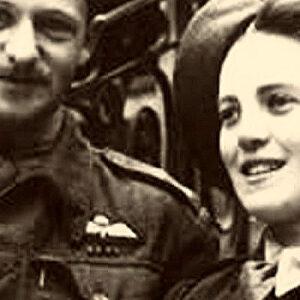When I was a newspaper reporter, one of my colleagues on the advertising side of the operation was as much a fan of the TV series “Justified” as I was.
My family hails from Tennessee, so I was attuned to the southern sensibilities of “Justified,” which was about flawed law enforcement agents and flawed criminals in modern-day Kentucky. My family knew many of the cities and wild places and types of people in the series. We recognized the truth and smiled at the exaggerations and appreciated how Kentucky tourism officials would feel when their state, on a weekly basis, was depicted as a place full of trashy rednecks and meth heads.
My coworker, on the other hand, was an East Coast émigré to Indiana and had probably never been closer to Kentucky than the Indianapolis 500. While he enjoyed the storytelling, he took the southern tropes seriously.
So when “Justified” would make a joke or two about the wildness and hostility of the people who lived in the hills and hollers of Kentucky, my coworker declared it was a place he would never go.
“I think they eat people up in those hills,” he said. I don’t think he was completely joking.
That’s a roundabout way of saying that “Justified” occasionally—well, maybe more than occasionally—played into stereotypes that had existed since the Hatfields met the McCoys. For six seasons and 78 episodes beginning in 2010, the FX series—available to stream on Hulu—both reinforced and defied some hillbilly stereotypes. It wasn’t all Dogpatch; the series, much of it filmed in California, took viewers to modern-day cities and courthouses and places like you can actually find in Kentucky.
That’s not to say Dogpatch wasn’t present. But it was a Dogpatch that was populated by meth-dealing idiots with Nazi tattoos and rocket launchers.
It was a Dogpatch—and a series—populated with flawed, conflicted, self-destructive people. And some of them were the good guys.
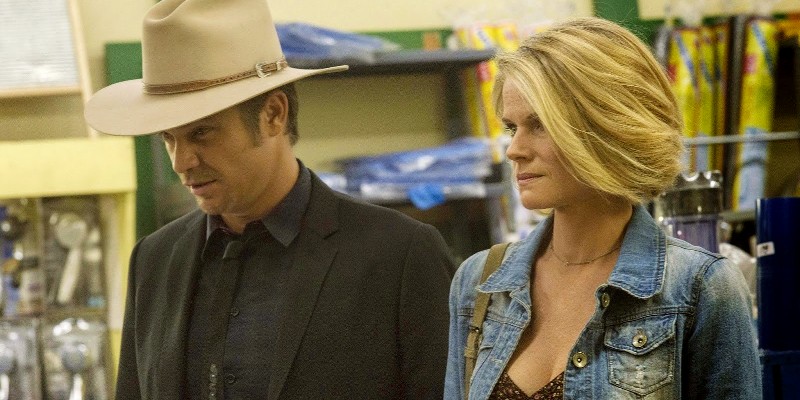
The word comes first—and the relationships follow
In the beginning was the word and that word was written by Elmore Leonard, one of the greatest American writers of the 20th century. Leonard, who died in 2013, wrote some of history’s best crime fiction and among that fiction was “Fire in the Hole,” a 2001 novella that sent U.S. Marshal Raylan Givens back home to a familiar place, the coal-mining territory of Kentucky, in pursuit of Boyd Crowder, a white supremacist who liked to blow things up real good. The two had dug coal together but despite the similarities in their upbringings and prospects, ended up on opposite sides of the law.
“Justified,” which was developed by Graham Yost, took those characters and their relationship and fleshed them out as few TV series can do.
Givens was supremely likable for a man whose internal temperature was always at “simmer” and who frequently disdained everyone in his path. Not to mention making some of the worst decisions a lawman could make. Crowder, prone to utterances of equal parts poetry and menace, became endearing, especially when compared to the murderous lowlifes in his orbit.
Leonard’s body of work, from early westerns to tough crime books like City Primeval, Fifty-Two Pickup and Get Shorty, informs “Justified.” Leonard wrote a few episodes of the show, but his characters and sensibilities couldn’t be more leavened throughout the series than if he wrote every episode. And he loved this world: his last published novel, in 2012, was Raylan, about the lawman who by that time was the focus of the TV series.
As great as the work of Leonard and Yost was, we might not be talking about “Justified” years later if not for the performances of Timothy Olyphant and Walton Goggins as Raylan and Boyd.
Really, the relationships between the show’s many damaged characters—Raylan and Boyd, Raylan and Art, his crusty supervisor in the marshal’s office, Raylan and Winona, his ex-wife, Boyd and Ava, Boyd’s dead brother’s wife, Raylan and fellow marshals Tim and Rachel, Raylan and Arlo, his good-for-nothing father, weed grower Mags Bennett and her “tads” (her shifty adult sons)—well, the relationships make “Justified” more than a crime show.
In the first season, “Justified” established the parameters of its story as well as Raylan’s two worlds—his life as a U.S. marshal, most recently assigned to Miami, and his life in Harlan County, Kentucky, where the gross domestic product is ostensibly coal but is really booze, prostitution, painkillers, meth and murder.
With Raylan’s background and familiarity with the people, Art sends him to Harlan to deal with not only Boyd Crowder but Raylan’s father, Arlo, a lifelong, smalltime criminal.
Like a famous movie scion, Raylan wants to get out, but he keeps getting pulled back in. And he’s pulled into a world entangled by family rivalries, double-dealing and matter-of-fact crime, punctuated by murder and by the weird-but-lyrical truths that Boyd and other Harlan residents spout.
Early on, Winona tells Raylan that he’s the angriest man she knows. That tracks, because every other person in the series’ principal setting of Harlan County is an angry law enforcement officer, a conniving criminal or just an opportunistic but hapless dumbass.
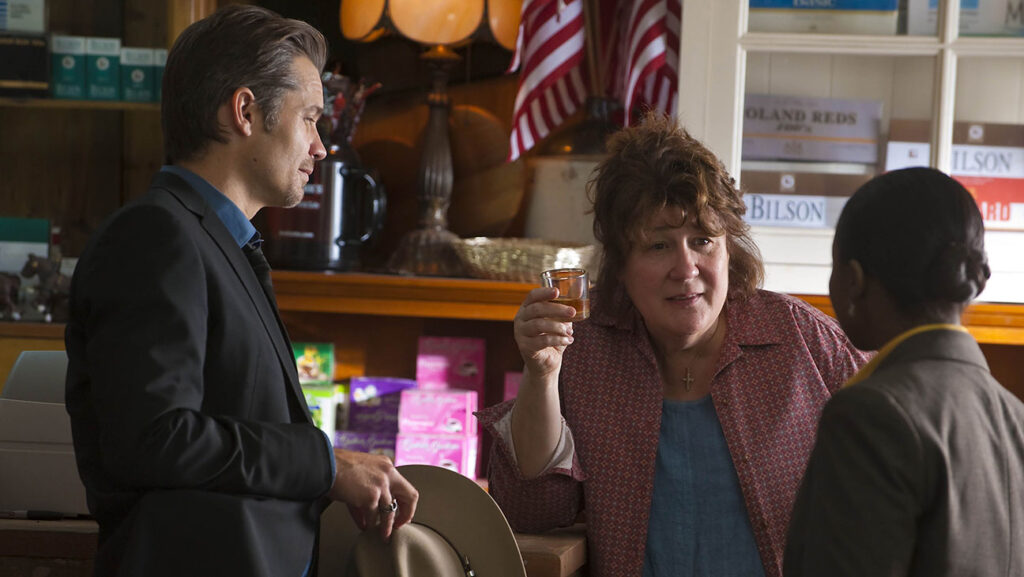
The ballad of Mags Bennett and her ‘tads’
Sure there are some great seasons of TV series out there. But dollar for dollar and bullet for bullet, it’s hard to top the second season of “Justified.”
In that season, Yost and the writers had settled into a confident groove with a mix of gritty storylines, deep character development and sarcastic dialogue. Goggins’ Boyd Crowder, only a recurring character in the first season, was a regular in the second season and the show took off like one of his rocket-propelled grenades.
It’s a testament to the writing and Goggins’ performance that he never gets lost in the second season, which gives a lot of the narrative to the Bennett family. As far as performances, it was a season dominated by the wily and dangerous but charming work of Margo Martindale as Mags Bennett.
The Bennetts, Crowders and Givens go back generations in Harlan County. Mags is a contemporary of Raylan’s father and her three sons—the aforementioned “tads” Dickie, Coover and Doyle—are contemporaries of Raylan and Boyd.
These relationships and rivalries, handed down through generations of outlaws who, like Raylan, occasionally find their violent acts endorsed by the government, are the backbone of the series.
And about matriarch Mags Bennett: Besides being the proprietor of a convenience store with a huge American flag on the side, Mags is dominant in the local marijuana market. She tries to keep her boys in line – tough love has never been tougher than when mama crushes fingers as punishment—as Raylan pokes and prods around the edges of the Bennetts’ efforts to expand their criminal enterprise. At the same time, Mags tries to protect Loretta McCready (the wonderful Kaitlyn Dever), her ward of sorts.
The second season is already an ambitious one, but then Yost layers in another element that feels like it could have been the subject of its own season: A coal mining company wants to come in and reduce a mountaintop to rubble and slag. Before long, both Raylan and Boyd are drawn into the company’s efforts and Mags can defy the coal company and present herself as the benevolent protector of Harlan County.
If “Justified” ended after the second season, it would still be praiseworthy. But the show continued to give us Raylan and Boyd and company.
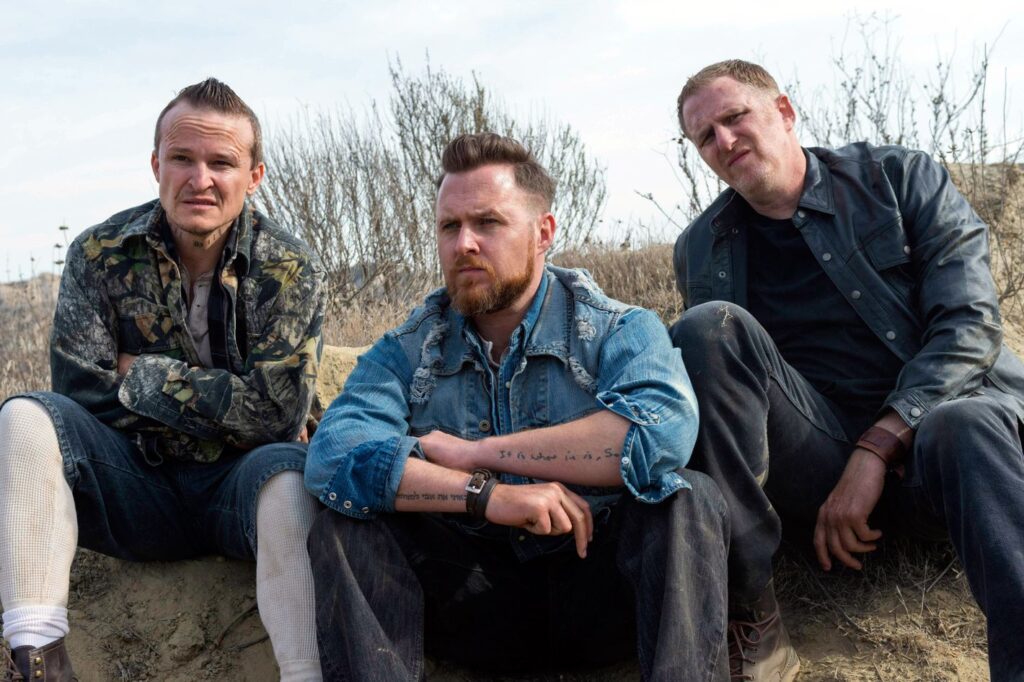
Variations on crime and death
I’ll admit, seasons three through six of “Justified” are a little less distinct in my memory than the first two seasons. But there’s no shame here, certainly not in seasons like these and with characters like these.
In the third season, the always-watchable Neal McDonough plays Robert Quarles, a murderous gangster exiled to Kentucky by out-of-town criminal syndicates. Quarles quickly establishes himself as more than murderous: he’s got issues, as somebody from Harlan might say. Quarles teams up with wry operator Wynn Duffy (can Jere Burns please be cast in every TV series?) to muscle into the local criminal enterprise. Mykelti Williamson, as sturdy and welcome an addition as McDonough and Burns, plays the leader of Harlan’s self-sufficient but stand-apart predominately Black community in Noble Holler.
“Justified” continues like that, exploring variations on crime and death in Kentucky and adding to its deep bench of fascinating characters. Arlo Givens is a big part of the fourth season’s mystery about long-missing money, Boyd faces rebellion inside his family and how did it take this long to introduce a traveling revival preacher to Harlan County?
Rewatching “Justified” episodes recently and finding a Dewey Crowe episode was like panning for gold and finding a nugget. Played by Damon Herriman, Dewey—he of the “heil hitler” neck tattoo and ambition and malice that far outstrip his abilities—is a constant highlight and fall guy for both Raylan and Boyd throughout the series. In season five, most of the Crowe clan shows up to try to take advantage of Dewey and I don’t have to tell you that with Michael Rapaport and Alicia Witt as members of the family, the viewing will be good.
The sixth season was something of a refocus on the core strength of the story, with a final showdown between Raylan and Boyd, who had acted as allies as often as antagonists. But even that season found time in its storyline for meaty roles for Sam Elliott—shockingly, without his mustache—and Mary Steenburgen. And Olyphant’s former “Deadwood” co-star, Garret Dillahunt, shows up in a part that seems strangely abrupt.
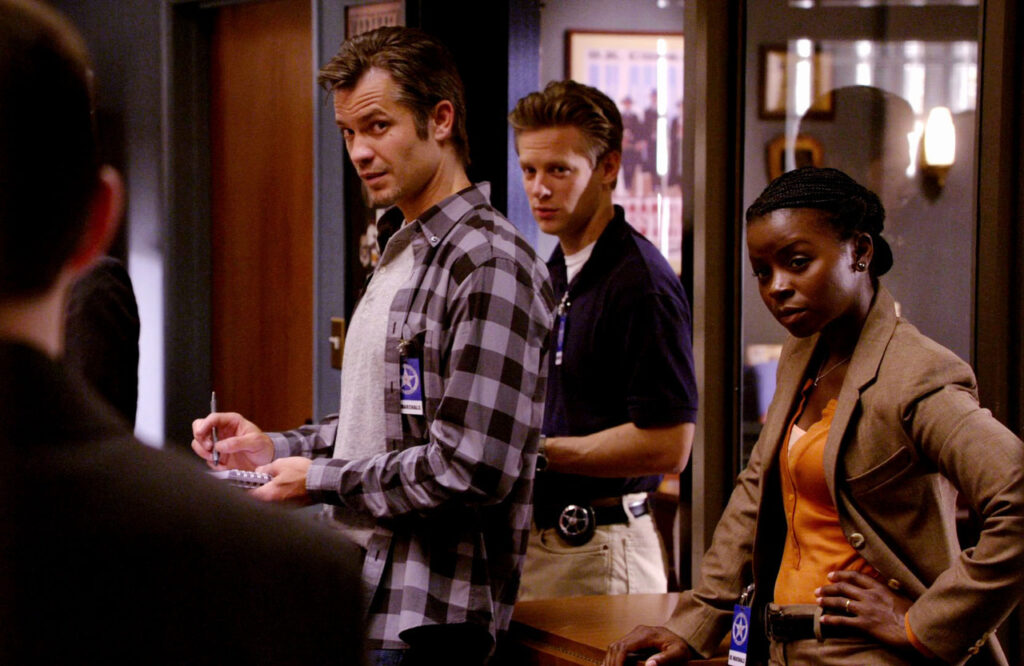
Art and Tim and Rachel and Constable Bob
The keys to a good TV series are the writing and the depth of talent in the cast. Can you imagine “Cheers” without Norm and Cliff? Well, maybe you can, but I don’t want to live in that world.
“Justified” had so many wonderful characters and actors for much of its run: Nick Searcy as Art, the top dog in the marshal’s office. Jacob Pitts as Tim, Raylan’s deadeye and deadpan partner. Erica Tazel as Rachel, the third part of the deputy marshal trinity here, beautifully portrayed as a Black woman in a world of jackasses with Nazi tattoos.
Agents of chaos make the series constantly surprising, and they include Joelle Carter as Ava, who has her fill of Crowder men until she decides to throw her weight behind Boyd. Natalie Zea as Raylan’s ex-wife Winona, who sets into motion one of the most squirm-inducing subplots of the series when she finds long-forgotten cash in a courthouse evidence locker. And Stephen Root as Judge “Maximum Mike” Reardon, who you might think is a cartoon of a judge but whose character, I can tell you, is not that much of an exaggeration. Ask me to tell you about the judge I knew who shot his Rolodex one time.
I won’t go on further about the cast but I will note that maybe Yost and the writers intended to wring some fun from Patton Oswalt as Constable Bob Sweeney, a lawman—famous for his “go bag”—from those same hollers that inspired my then-coworker to become convinced that Kentucky was “The Hills Have Eyes” territory. Oswalt’s Sweeney is a figure of fun early on but before the end of his storyline, he proves to be the toughest damn lawman in Harlan County.
Most of us would have aspired to the cool—and maybe even the heat—of Raylan Givens or Boyd Crowder, but in truth, we’re more like Constable Bob: well-meaning, strong-hearted and always ready.
In the world of “Justified,” sometimes that’s enough.

A Harlan County coda
The world lost Elmore Leonard in 2013. We’ll always have his books and screenplays. For those who know him mostly through “Justified,” I’ll assure you that there’s more where that came from throughout his body of work.
“Justified” creator and executive producer Graham Yost is still working hard and giving us unique takes on crime drama that, sneakily enough, are expert takes on human nature.
He was an executive producer of “The Americans,” which filtered the suspense genre through the eyes of Russian agents in 1980s America. But the series that bears Yost’s stamp as spiritual successor to “Justified” is “Sneaky Pete,” which ran for three seasons on Amazon Prime Video. And it gave us more of Mags, actress Margo Martindale.
Like “Sneaky Pete,” “Justified” had many snappy and sarcastic lines of dialogue—far too many to recount here, but a couple stand out even for casual fans.
Raylan pays an unwelcome visit to Wynn Duffy and Robert Quarles and, after punching Duffy and putting his boot on his neck, Raylan drops a bullet on Duffy’s chest.
“Next one’s comin’ faster,” Raylan warns him.
But it might be some of the last lines of dialogue in the series, in a scene between Raylan and Boyd, that pulled off what many shows can never achieve: A final word that is poetic and full of grace.
The two men, separated by their roles in the worlds of crime and the law, are now separated by the glass of a prison visitation booth.
But they recognize their shared background as Boyd—not for the first time in the series—says, “We dug coal together.”
















